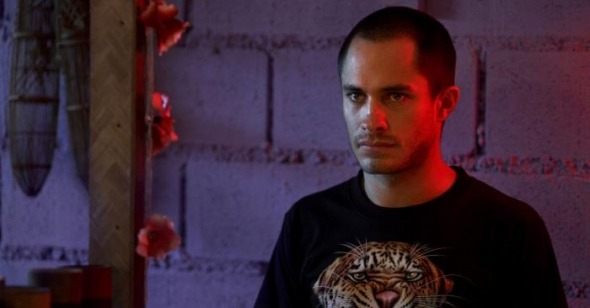Distant Voices, Shrill Lives
by Eric Hynes
Mammoth
Dir. Lukas Moodysson, Sweden, IFC Films
Much can be said about the concept and implications of globalization. That it’s good for corporations, indifferent to local economies and cultures, rough on the working class. Here’s another: globalization inspires very bad art. Besides Jia Zhangke and Olivier Assayas, who understand commercial exchange as being inseparable from life, and see business as transforming but not necessarily debasing human relations, most filmmakers approach globalization as an existential death-match between capitalism and the human soul. Now that we’re so connected, goes the thinking, we struggle to connect. We want to go home, but we’re spiritually lost. Fractured stories reflect our fractured selves. Modern life is an Edward Hopper painting, with everyone everywhere staring off into the distance, texting into the void, and muttering about the media and America.
The one helpful thing about Paul Haggis’s Crash winning the Best Picture Oscar in 2006 is that future historians will have an easy time identifying the pop-psych foolishness of our era. “We’re always behind this metal and glass,” goes that film’s opening monologue. “I think we miss that touch so much, that we crash into each other, just so we can feel something.” Hollywood doesn’t have a monopoly on fortune cookie existentialism though, as freshly exhibited by Swedish writer-director Lukas Moodysson’s dismaying career killer Mammoth.
Moodysson centers his film in sleek, mod-metro New York (home base is a Soho penthouse) and networks out to Thailand and the Philippines, each locale shot impersonally, metaphorically. The film opens on a catalogue-cute family laughing and roughhousing on the living-room rug. Ellen (Michelle Williams) is a surgeon, Leo (Gael Garcia Bernal) is a video gaming entrepreneur, and seven-year-old Jackie (Sophie Nyweide) is adorably free of her two front teeth. Soon Ellen reports to the ER, Leo jets off to sign a multimillion-dollar deal in Thailand, and Jackie is whisked off to the Hayden Planetarium by her Filipino nanny, Gloria (Marife Necesito). Briefly together, they are now apart, and will remain so until dad returns home and the nuclear family is restored (and Gloria returns to her own fractured family). In the meantime, Mammoth happens.
Moodysson has never been a subtle filmmaker. Whether he’s thrusting the viewer into the world of sex trafficking in Lilya 4-Ever or literally spilling the guts of damaged pornographers in A Hole in My Heart, Moodysson demands engagement and empathy. He can be a bully, but he’s often an impassioned one. Lacking such conviction, and missing the messy bleeding hearts that Moodysson normally celebrates, “Mammoth” is a jumble of cliched ideas very clumsily expressed.
Ellen and Leo represent and mostly behave like self-involved, knee-jerk liberals, but they also never do anything egregious. They hardly do anything at all, in fact, other than pursue careers that don’t seem to interest Moodysson and say silly, ignorant, narcissistic things that often sound less so coming from two naturally sympathetic actors. Williams, though game as ever, is so implausible as a workaholic MD that Moodysson rushes her out of her scrubs and into her skivvies. She fights insomnia and maternal irrelevance in-between night shifts. Meanwhile Leo, a mascot waiting for his deal to come through, mopes around a fancy hotel room before retreating to a cheap bungalow on the beach, where he gives elephants and prostitutes soulful, what-does-it-all-mean stares. In thickly scripted contrast, while in Manhattan nanny Gloria teaches Jackie beginner’s Tagalog, her two young boys struggle to live without her in the Philippines, a plot strand that ties in child labor, pedophilia, abduction, and a limp-bodied pieta down by the river.
Moodysson shoots his actors in melancholic pose—they confront the sunset, the stars, the smoggy skyline, cable TV, a super-hot Thai prostitute—then provides them with dialogue that literalizes the emotion. Ellen worries over a patient, a young boy (never conscious, safely symbolic) stabbed by his own mother. “What a sick world,” she says, before heading home to crawl into her daughter’s bed, pet the stuffed animals, and nonsensically mouth into the cell phone that “it could have been Jackie.” More than superfluous dialogue, “Mammoth gets really excited about parallel editing. A child snoozing in a warm bourgeois bed begets another asleep behind a mosquito net begets another unconscious in a hospital bed begets a man-child asleep on a private jet.
All are alone or feeling so. Ellen takes to a treadmill; Gloria weeps; Leo’s marooned in paradise; emails are ignored; ear buds play only Cat Power. Cell phones, symbols of distance and connection, abound but prove doubly inadequate: not only can’t they cure loneliness, they remind the viewer that with the possible exception of Michael Mann films, they are profoundly anti-dramatic devices. Everyone in Mammoth wants to be elsewhere, and for 126 minutes I felt their pain.
